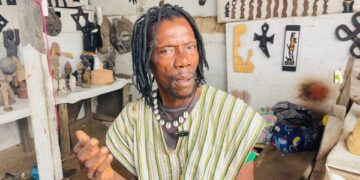World Art Day is an international celebration of the fine arts, declared by the International Association of Art to promote awareness of creative activity around the globe. Observed every April 15, the day highlights cultural diversity and the power of art in shaping lives and societies.
This year’s theme — “A Garden of Expression: Cultivating Community Through Art” — emphasizes how creativity can bring people together and transform communities.
As Ghana marked Heritage Month in March — a time when we showcased our traditions, music, fashion, and vibrant cultural expressions — deeper stories emerge from the corners of our communities. In Jamestown, a community widely known for its boxing talent, lies a different kind of fighter — 53-year-old Adjei Sowah, a wood carver. He spends his days trying to teach dropouts and young people the skill of carving. But there’s a challenge.
“We initially thought the government will support the tourism sector, but it’s not so. I learnt automobile but didn’t apply because I know I will not be employed. So I went to learn arts and crafts at Art Centre. I set this place up when I completed the course, but I realized there’s a need to impact on the community so I decided to summon the youth and teach them the craft. But this hasn’t been easy, because I can’t teach them and still feed them. Most of the kids go to the sea to collect empty bottles, sell them before they can eat. I am doing this with a hope that social vices in the community will reduce,” he bemoaned.
Ghana’s art industry is growing steadily, with the creative arts sector contributing to national GDP. The Industrial Art and Craft sub-sector, in particular, has recorded an increase in export earnings. But according to Ms. Juliana Kwofie, a Journalism and Arts Lecturer at the University of Media, Arts and Communication says, celebrating artists is not enough — we must build systems that support them and called on institutions to support the youth at Jamestown.
“I will not say in all aspects of the art industry, because there certain arts that we don’t talk about. When it comes to our architecture, we don’t education people why we built that way. The problem we have is lack of education. If you have not eat, if there is nothing in your pocket, how can you say you are going to sit down and learn the craft and take it serious. Even if you are learning, your mind will be somewhere else. We always say that government should step in, but I will advocate that individuals should take responsibility and support this course. There are people that appreciate arts, who will be more than willing to help,” she urged.
For artisans like Adjei Sowah, art is not just a form of expression — it’s a tool for empowerment. But he believes more must be done. He called on President Mahama to support the youth in the Jamestown community learn the craft.
“The government really have to come to the aid of these youth as I support with my free teaching. Government can support us with foodstuffs, which will go a long way to help us. Most of these youth are school dropouts, so we have to help them with a skill that will be useful to them,” he added.
As the world marks World Art Day, Jamestown reminds us that art should not only be celebrated — it must be sustained.

































